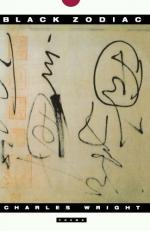|
This section contains 928 words (approx. 4 pages at 300 words per page) |

|
SOURCE: “A Tenth and Four Fifths,” in Poetry, Vol. CXLI, No. 6, March, 1993, pp. 349-58.
In the following review of The Southern Cross, Kennedy commends Wright's poetic ear and controlled lines, but finds shortcomings in the lack of theme in his poetry.
Charles Wright continues on his serious quest for ineffable beauty and serenity [in The Southern Cross]. Like other Romantic aspirants whom he admires (Keats, Hart Crane), Wright is subject to fits of gloom—see, for instance, the song lyric “Laguna Blues.” At times, the hardships of his quest make him yearn for irresponsibility, insensibility, even freedom from words. No living person other than the poet is sharply seen, although a lot of names are dropped. Several poems are entitled “Self-Portrait,” while yet another paints the poet in Hart Crane's company. The world of Wright's poems contains few actions, being filled with perceptions, feelings, and twinges of memory...
|
This section contains 928 words (approx. 4 pages at 300 words per page) |

|


